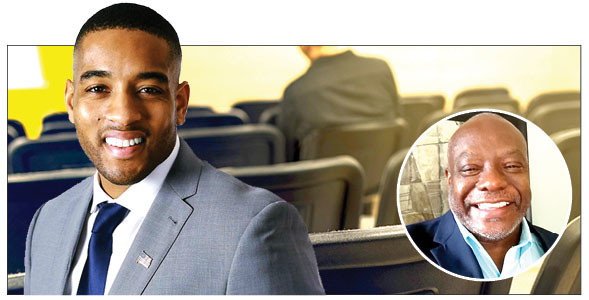By Phyllis Jones, Speakin’ Out News, Sr. Staff Writer

The City of Huntsville is known for its rocket scientists, a collegiate town and one of the best places to live (ranking 11th) according to U.S. News and World Report in 2019.Unfortunately,it’s also known for its lack of diversity on some of the city boards.
According the City of Huntsville website, Huntsville citizens have the opportunity to volunteer their services to the City, without pay, on various boards and commissions. These have been established by either City charter, the Alabama legislature, or the Huntsville City Council. There are two different types of boards and commissions for citizen appointment. Some are appointed entirely by City officials – the Mayor and/or City Council, and others are jointly appointed by the City and other organizations. Over the years, some city boards have had very little or no African American presence. Why is that?
Councilman Devyn Keith, who represents District 1 and serves as the council’s President said, “Over 60% of the boards have some form of African American representation. The City Council appoints 90% of the boards. The remaining 10% of the boards are a mixture of appointments by the Mayor and the County Commission.”
There are 59 boards, of which 11 of them are considered Tier 1 Boards. Tier 1 Boards are considered the most powerful boards in the City of Huntsville, in terms of the $1B budgets they oversee. These boards shape the city as far as tourism, healthcare, utilities, affordable housing, transportation and commercial development. The Tier 1 Boards are as follows: Health Care Authority of the City of Huntsville, Huntsville Electric Utility Board, Huntsville Housing Authority, Planning Commission of the City of Huntsville, Huntsville Public Library Board, Huntsville Water Utility Board, Huntsville-Madison County Airport Authority, Huntsville-Madison County Convention and Visitors Bureau Board of Directors, Huntsville Madison County Mariana and Port Authority, Industrial Development Board of the City of Huntsville and the Von Braun Center Board of Directors.
During a city council meeting held in May, Councilman Keith addressed his concern over the lack of diverse appointments on the Tier 1 Boards. “This city council represents the beauty of diversity in a state like Alabama: two strong women, two African Americans and wisdom from an individual who has been here and has tenure. The people we appoint do not.” Keith believes that Huntsville can be an efficient city with diverse backgrounds.
Of the 11 Tier 1 Boards, only four of them never had members who were African American or women. Of those 11 boards, 70% are non-minority and 77% are male. Councilman Keith recalled a past conversation he had with former Councilman Mark Russell (District 2), discussing how fresh blood was needed on some of these boards. The average time served on Tier 1 Boards is 20 years. Councilman Keith shared that five individuals, who have served on these top boards, have served for more than 30years. Of these same 11 Tier 1 Boards, only eight have been a board for 40 years. He asked the question, “Are we appointing or reappointing people who are in a sphere of influence, but not in the best sphere of influence for the city of Huntsville?
Back in 1993, Reginald McKenzie was appointed to the Huntsville Hospital Board of Directors to serve a 6 year term. For each open position on the board, the hospital had to submit three names to the City Council. McKenzie name was recommended by former Councilman Richard Showers, Sr. (District 1). He was the first African American to serve as a board member in the hospital’s nearly 100 year history. At the time of his appointment, he replaced Alvin Blackwell, who had served on the board for 32 years and had served as the chairman for 24 years. McKenzie served on the Finance, Long Range Planning and Building and Professional Affairs Committees. As a result of his service, the board purchased Humana Hospital, opened the Women and Children’s Hospital, constructed Madison Street Tower, The Heart Center, Orthopedic Center, Medical Mall and the TRAM system. McKenzie was also instrumental in the strategic planning and the land purchase for Madison Hospital.
Initially, as the only African-American on the board, there were times McKenzie felt as if his input wasn’t valued. “In reviewing the hospital employee positions, I noticed that the majority of African Americans were either cooks or custodians. I raised this issue during a board meeting and asked why were there no African Americans in other key positions (i.e. IT, accounting, etc.). I received the classic answer: ‘We cannot find any’”, McKenzie stated. Knowing that there were plenty of qualified African American candidates, McKenzie proceeded to provide resumes and encouraged the board to place more emphasis on finding qualified minorities to work in these key positions.
After McKenzie’s first year on the board, three vacant seats were up for nomination. Two of the incumbents were not seeking another term. His nominee was placed in the same seat as the Chairman of the Board, who was up for reappointment. “I pleaded with the Board to put my nominee (an African American) in one of the vacant slots with no incumbent, but they refused. By the hospital placing the Board Chairman in the same slot as my nominee, he was not reappointed for a 3rd term”, and my nominee was selected.
As a one term (six years) board member, McKenzie had victories, as well as defeats. One main victory was being able to place an African American doctor in Northwest Huntsville. Dr. Michael Johnson was one of the first African American doctors to contract with Huntsville Hospital in North Huntsville. When McKenzie initially asked the board why they hadn’t considered placing practices in North Huntsville, he was told, “They would lose money.” Numbers were presented to McKenzie showing that if Dr. Johnson were to set up in North Huntsville, the hospital would lose money. However, the board didn’t expect the new kid on the block to present numbers showing that they would actually make money. When McKenzie was asked where he got his numbers from, he replied, “I made them up just like you did.” McKenzie’s numbers showed that 90% of his patients in North Huntsville would have BlueCross BlueShield Insurance and no money would be lost. Dr. Johnson did not renew his contract with Huntsville Hospital and built a new facility in North Huntsville on Jordan Lane.
In 1998, McKenzie was instrumental in a joint venture proposal between the hospital and Central North Alabama Health Services to build a 50,000 square feet facility on the corner of North Parkway and Winchester Road (the current location of Bojangles). The concept consisted of a 20,000 square foot Primary Care/ Urgent Care and a 30,000 square Wellness Facility. The facility consisted of a gym, boutiques, spa and a pool. The Urgent care would have been open until midnight, taking pressure off Huntsville Hospital Emergency room. The Primary Care would have consisted of 4 doctors’ offices as well. The proposal was ultimately removed from consideration.
After his term ended, the second African American Vice-President (Herbert Buchannan, a MIT graduate, Kellogg School of Management and Hospital Administration Degrees ), was also relieved from his duties, leaving the hospital with no African Americans Vice-Presidents. Mr. Buchannan left Huntsville and was selected as CEO of Howard University Hospital and then became President of both IU Health and Methodist Hospital and IU Health University Hospital in Indianapolis.
McKenzie truly believes that his consistent passion to display diversity in Huntsville Hospital caused him not to be reappointed for a second term. He was the first African American on the board and the first person to not be reappointed for a second term. This was the first time an incumbent board member (without cause) had not been automatically placed on the list of three names, submitted to the City Council for selection,” stated McKenzie. Today, Huntsville Hospital has a new administration and all new board members, whom McKenzie hopes are doing the right thing, regarding the entire Huntsville community.
McKenzie strongly believes that the City Council should ensure that a diverse dedicated group of citizens are represented from every district, on all boards and commissions. He expressed, “The City of Huntsville could be the greatest city in the nation with the diversity and talent we possess. I hope that one day my sisters and brothers in the majority would allow more inclusiveness and not look at African Americans as a threat, but as an asset. Diversity is our Strength.”
Councilman Keith stated that he can’t be the sole person making African American nominations for board positions. He need multiple board members to make nominations as well. “The most diverse board in the City of Huntsville is the City Council, but our management group, outside of the City Council, who manages more money than the city budget, doesn’t look anything like us.” Councilman Keith continues, “We tell people they should get involved, but at the end of the day, they don’t have a chance to get involved. The question is not if the city is in favor of diversity. The question is, is the council in favor of diversity?” According to the City of Huntsville website, the Huntsville Electric Utility Board (Tier 1 Board) have members serving their consecutive sixth and eighth, three year length terms. Is this due to the inability to find others who are willing to serve? Is it fair for the City Council to allow people to serve on boards until “death do them part”? Surely not. If any Huntsville citizen is interested in becoming a board member, please visit www.huntsvilleal.gov/ government/boards-commissions/, select a board that matches your expertise and contact your city councilman or councilwoman for consideration for that position.
According to the website, the following boards have terms expiring soon: Huntsville Housing Authority, Planning Commission of the City of Huntsville and the Von Braun Center Board of Directors. Also, feel free to approach other members of the City Council as well. As Councilman Keith puts it, “diversity must be deliberate.” As citizens, we must do what needs to be done to get a seat at the board table.
According to the City of Huntsville website, the Huntsville Electric Utility Board (Tier 1 Board) have members serving their consecutive sixth and eighth, three year length terms. Is this due to the inability to find others who are willing to serve? Is it fair for the City Council to allow people to serve on boards until “death do them part”? Surely not. If any Huntsville citizen is interested in becoming a board member, please visit www.huntsvilleal.gov/ government/boards-commissions/, select a board that matches your expertise and contact your city councilman or councilwoman for consideration for that position. According to the website, the following boards have terms expiring soon: Huntsville Housing Authority, Planning Commission of the City of Huntsville and the Von Braun Center Board of Directors. Also, feel free to approach other members of the City Council as well. As Councilman Keith puts it, “diversity must be deliberate.” As citizens, we must do what needs to be done to get a seat at the board table.




